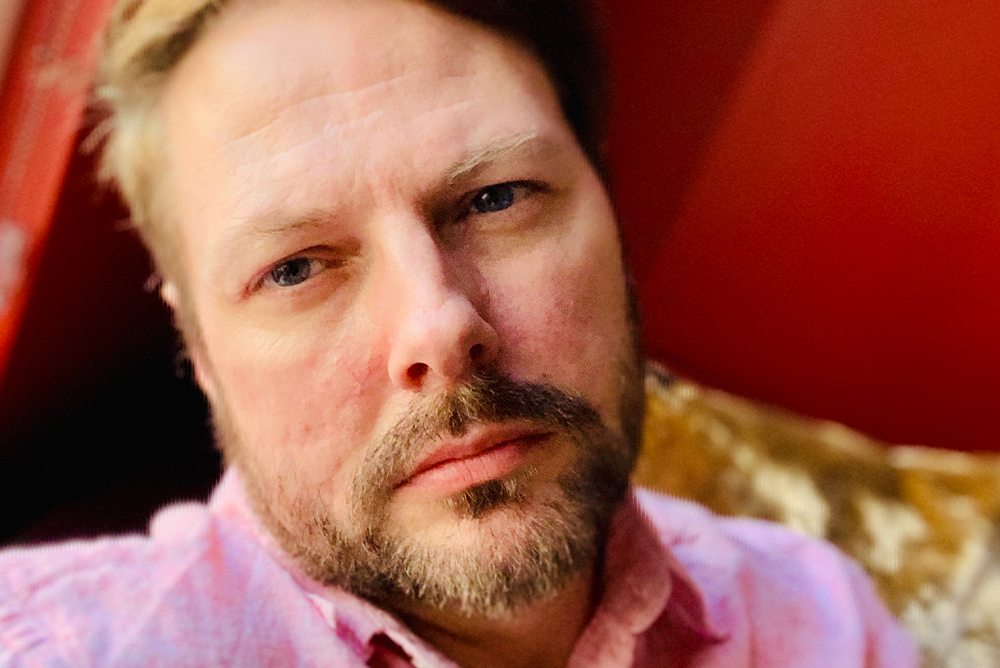
Courtesy of Richard Greenfield.
Richard Greenfield teaches creative writing at the Creative Media Institute at New Mexico State University. He is the author of three books of poetry, most recently, Subterranean, and is one of the founding editors of Apostrophe Books. Zócalo’s poetry curator for February, Greenfield chatted with us in the green room about Korean army stew, Navajo poet Sherwin Bitsui, and finding hope “in the face of everything.”
How has the pandemic affected the way you think or write poetry?
One of the things I became interested in as a writer was observing how, even in the reality of the pandemic, there was a kind of repression or delusion that was so desirable by so many. All they wanted was to pretend it wasn’t happening—to repress their responsibilities to society. But I think poetry doesn’t let us off the hook. We have to continue to bring it up to the surface. For me, there’s something almost aggressive about poetry in its capacity to not let us forget.
Besides the poets you’ve curated for us, who is a poet you’re reading right now?
Sherwin Bitsui, a Navajo poet. His most recent book is Dissolve. There’s something uncanny in the use of his language that defies categories. I’ve talked to him about his poetry before. Some of the grammatical structure that he uses in his English writing comes from Navajo, and so it creates really strange and beautiful syntax. It’s liminal. I feel like his words are halfway between waking life and dream life. I think he’s one of our most innovative poets right now.
What movie do you think will win “Best Picture” at the Oscars this year?
Killers of the Flower Moon. It was so relentless in presenting evil. And it did it in this completely sort of unsentimental way that made it hard to watch, but by the end, I was really absorbed in that world.
If you didn’t live in the United States, what country would you want to live in?
I spent about four months living in Athens last year, and I fell in love with Greece. Especially walking in the older areas of the Acropolis, there’s something about the way light hits the ruins that are everywhere intermixed with modern buildings. This bricolage of the ancient and the contemporary, and the way that the light hits and casts shadows—there’s a golden aura surrounding everything.
What’s hanging on your living room walls?
I’m friends with a lot of painters and artists, and I like to support them, and buy their work. I especially love collage work. In my living room, one of the pieces that I really love is by Anthony Hawley, a poet who transitioned over to being a visual artist.
What is one food that’s irresistible to you?
I love Korean food, the stews especially. Budae jjigae—“army stew”—is probably my guiltiest of pleasures. It’s this wonderful mix of red pepper broth with cooked kimchi, sometimes with pieces of tofu or pork belly added. And on top of that, it has American cheese, hot dogs, and instant ramen. It’s a working-class food because, after the war in Korea, Spam, hot dogs, and American cheese were the food that were handed out from military surplus, so they mixed it with their kimchi jjigae, and took it to this other level. Anthony Bourdain was a big fan, too.
In an alternative universe where you took a different career path, what would you be doing now?
I’ve recently developed a fondness for wine and a deeper knowledge of it. Sometimes I have a romantic idea of a life where I’m a vintner or a winemaker.
You teach creative writing. What’s a piece of work that you assign to your students as essential reading?
I experiment so much and am constantly changing things up, but I do end up recommending and teaching parts of Richard Hugo’s The Triggering Town. The concept is that the beginning subject that people begin to write about when they start a poem is typically not really what the poem is trying to get at or where it’s heading. For many beginning poets, they have a hard time letting go of that first beginning subject. Sometimes, that’s intentional. They think, ‘I’m going to write a poem about my mother,’ and instead of letting the poem sort of float and develop and grow in the direction it wants to go—which could move away from the topic of the mother—they force the poem to, sort of like a thesis, to support the “aboutness” that they intended. And so, Hugo calls that first subject that start the poem the “triggering subject.” The real subject of the poem will be only secondarily arrived at if you allow the poem to branch off and to digress from the triggering subject.
What surprises you most about your life right now?
Sometimes I’m surprised I have hope in the face of everything. I still wake up and there’s the sun and, in the morning, I feel really excited to get to living life. No matter what’s happening, there’s always hope. It probably says something about my personality that that surprises me. I’m glad for it, but I find it unexpected.



